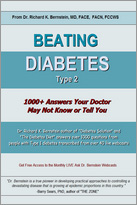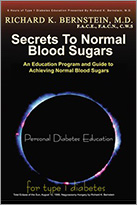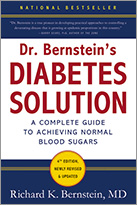Some diabetics have absent or diminished ability to experience the warning signs of hypoglycemia. This occurs under five circumstances that have been documented in the scientific literature:
- Severe autonomic neuropathy (injury, by chronically high blood sugars, to the nerves that control involuntary bodily functions).
- Adrenal medullary fibrosis (destruction, by chronically high blood sugars, of the cells in the adrenal glands that produce epinephrine). This is especially common in long-standing poorly controlled diabetes.
- Blood sugars that are chronically too low.
- The use of beta-blocking medication for treatment of hypertension or cardiac chest pain.
- The use of large (nonphysiologic) doses of insulin, as is common for individuals on high-carbohydrate diets.
All of these situations result in lowered production of, or sensitivity to, epinephrine, the hormone that produces tremor, pallor, rapid pulse, and other signs that we identify with hypoglycemia. It is ironic that epinephrine production or sensitivity is most commonly diminished in those whose blood sugars have been chronically either very high or very low.
Injury to the autonomic nervous system by elevated blood sugar has been discussed on pages 61–62. Individuals whose heart rate variation on the R-R interval study is severely diminished may be especially susceptible to this problem.
People who have frequent episodes of hypoglycemia or chronically low blood sugar tend to adapt to this condition. They appear to be less sensitive to the effects of epinephrine, which, when repeatedly released in large amounts, down-regulates its own receptors. This condition cannot be predicted by R-R studies. It is, however, readily detectable if you measure your own blood sugar frequently. If caused by chronically low blood sugar, this condition can be reversed by taking measures to ensure that blood sugar is maintained at normal levels.
Hypoglycemia unawareness can deprive one of potentially lifesaving warning signals. To compensate for this disability, blood sugar should be checked more frequently. For some rare insulin users, it may be necessary, for example, to measure blood sugar every hour for 5 hours after meals, instead of only once or twice after each meal. Fortunately, we have the tools to circumvent this problem; we need only to use them diligently.
I frequently encounter patients who do not take glucose tablets for low blood sugar measurements because they “feel fine.” These are just the people who are most likely to lose consciousness or find themselves in an automobile accident.
Whether or not you have hypoglycemia, it is essential that you check your blood sugar before driving a car and — after finding a place where you can safely stop your vehicle — every hour while driving.




